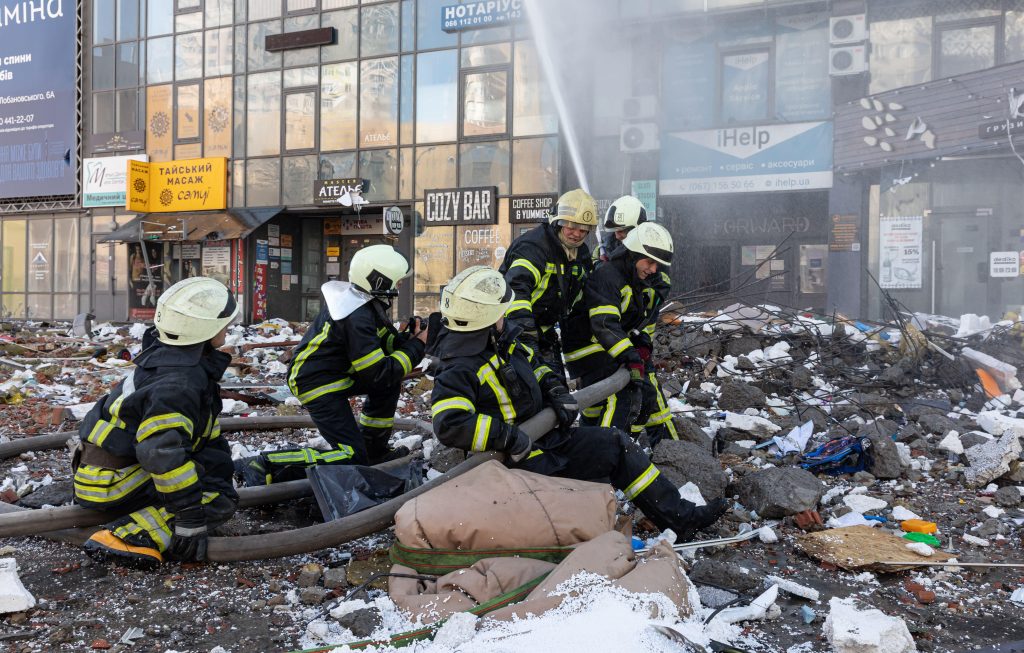Russian shelling briefly set part of Europe’s largest nuclear power station in Ukraine ablaze, while advances in the south of the ex-Soviet state put tremendous pressure on the port of Mariupol.
Ukrainian President Volodymyr Zelensky called for an urgent meeting with Kremlin leader Vladimir Putin to stop the fighting that has engulfed much of the country and sent more than a million Ukrainians fleeing across international borders. He repeated calls for a Western-installed “no fly zone” over Ukraine and, failing that, asked for aircraft to bolster his country’s defences.
Putin coolly said the “special military operation” was going “strictly according to plan”, though he acknowledged that Russian forces had suffered losses. French officials, speaking after Putin had yet another conversation with President Emmanuel Macron, said they were convinced Putin would not stop until the entire country was subdued.
Russian shelling set fire to several floors of a training building at the Zaporizhia nuclear power plant – which has six reactors, though not all are functioning at the moment. Ukrainian officials said firefighters initially had difficulty securing access to the building, but the blaze was quickly brought under control with no rise in radiation in the facility. The International Atomic Energy Agency also said there had been no increased radiation or damage to the plant’s fundamental equipment.
The incident – and the prospect of an accident involving a nuclear plant in the country that was the site of the 1986 Chernobyl disaster – triggered international denunciations.
U.S. President Joe Biden urged a halt to Russian attacks on the facility, Canadian Prime Minister Justin Trudeau condemned the “horrific” Russian action and British Prime Minister Boris Johnson said the “reckless actions of President Putin could now directly threaten the safety of all of Europe” – all three to Zelensky immediately after the incident. The United States activated its Nuclear Incident Response Team.
Key cities pounded
The late-night incident followed a day of Russian bombardment of strategic targets. Officials said the Sea of Azov port of Mariupol faced a humanitarian catastrophe after sustained shelling. The port is seen as a key Russian objective in creating a corridor between Crimea, annexed by Moscow in 2014 and two separatist areas in eastern Ukraine run since then by Russian proxies.
Shelling also targeted Chernihiv just over the Russian border – officials said 33 people died in strikes on residential areas, including schools and a high-rise apartment building. Video footage, some of it taken by drones, showed devastation in a number of towns A video of Borodyanka, 60 km northwest of Kyiv, showed entire residential areas in ruins, with smoke engulfing buildings and fires still burning in some apartments.
But the Russians’ appeared to be making slow progress in their advance on the capital – a convoy many km in length has made only limited headway in the last three days, suggesting that Ukrainian defenders were proving effective at keeping it from advancing.
Putin launched the full-scale attacks after weeks of building up Russian forces on Ukraine’s border, saying the West had disregarded his calls for “security guarantees”, including an assurance that Ukraine would never be allowed to join NATO. The Kremlin leader said the main objective of the incursion was to “demilitarise” and “denazify” Ukraine.
Russian and Ukrainian negotiators held a second round of talks near the border with Belarus – Russia’s longstanding ally to the west – but Ukrainian presidential adviser Mykhailo Podolyak said no agreement on a cease-fire was achieved. The two sides did agree to set up humanitarian corridors to allow refugees to leave and for medicines to enter.
In Geneva, the U.N. High Commissioner for Human Rights, Michelle Bachelet, led calls at a session of the U.N. Human Rights Forum for an immediate cease-fire. The Russian invasion, she said, had “opened a new and dangerous chapter in world history”.
Zelensky, tired and unshaven, told a news conference that agreement on ending the fighting could only be achieved if he met directly with Putin. The Russian leader has repeatedly rejected Zelensky’s request for talks in the past year.
“It’s not that I want to talk to Putin,” he said. “I need to talk to Putin. The world needs to talk to Putin. There is no other way to stop this war.”
Zelensky expressed impatience with repeatedly requests to France and Germany to establish a “no fly zone” to curb Moscow’s ability to hit its targets. Western countries have ruled out the idea as too risky in bringing NATO troops into contact with Russian forces.
How many legs, arms and heads, the president asked, had to be blown off before the West would introduce such a measure.
“If you do not have the power to close the skies, then give me planes!”
“According to plan” – Putin
Putin, in a television address to the Russian Security Council, said: “The special military operation in Ukraine is going according to plan, in strict accordance with the schedule. All tasks are being successfully carried out.”.
Putin spent 90 minutes in apparently tense conversation with Macron – who led a frenzied last-minute diplomatic initiative in the final days before the invasion. to find a negotiated settlement. The two leaders have spoken several times In the past two weeks.
“Our analysis of the military operations is that the Russian ambitions are to take control of all of Ukraine,” said a senior official in the French presidency. Macron, he said expressed “pessimism” after the call.
In Moscow, the stock market remained closed for the fourth consecutive day. The rouble sank further to about 116 to the U.S. dollar and a new string of Western companies declared they were halting their activities in Russia.
Swedish furniture company IKEA announced it was closing all its stores in both Russia and Belarus. Computer chip maker Intel said it would no longer sell to customers in both countries. Oil majors BP and Shell announced plans earlier this week to abandon all investments in Russia.

